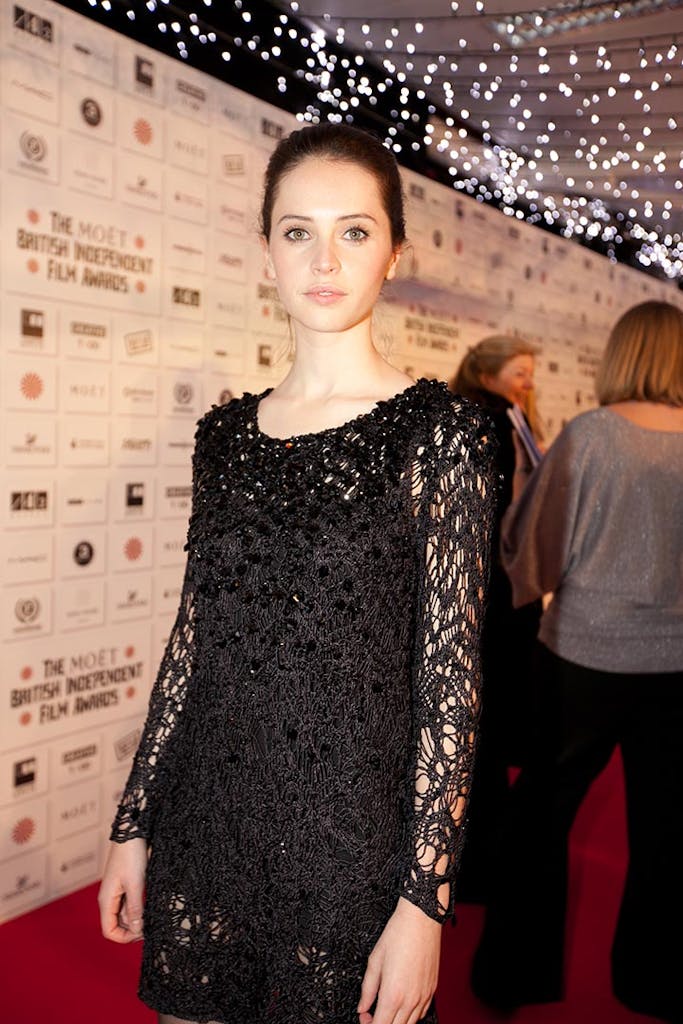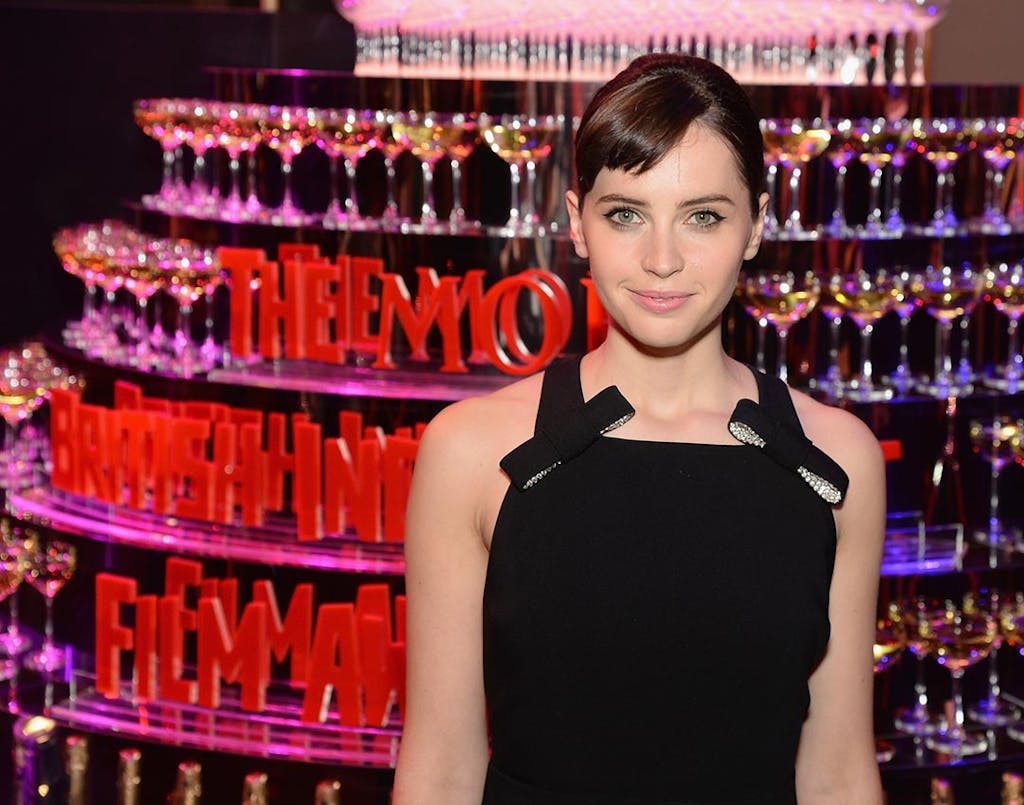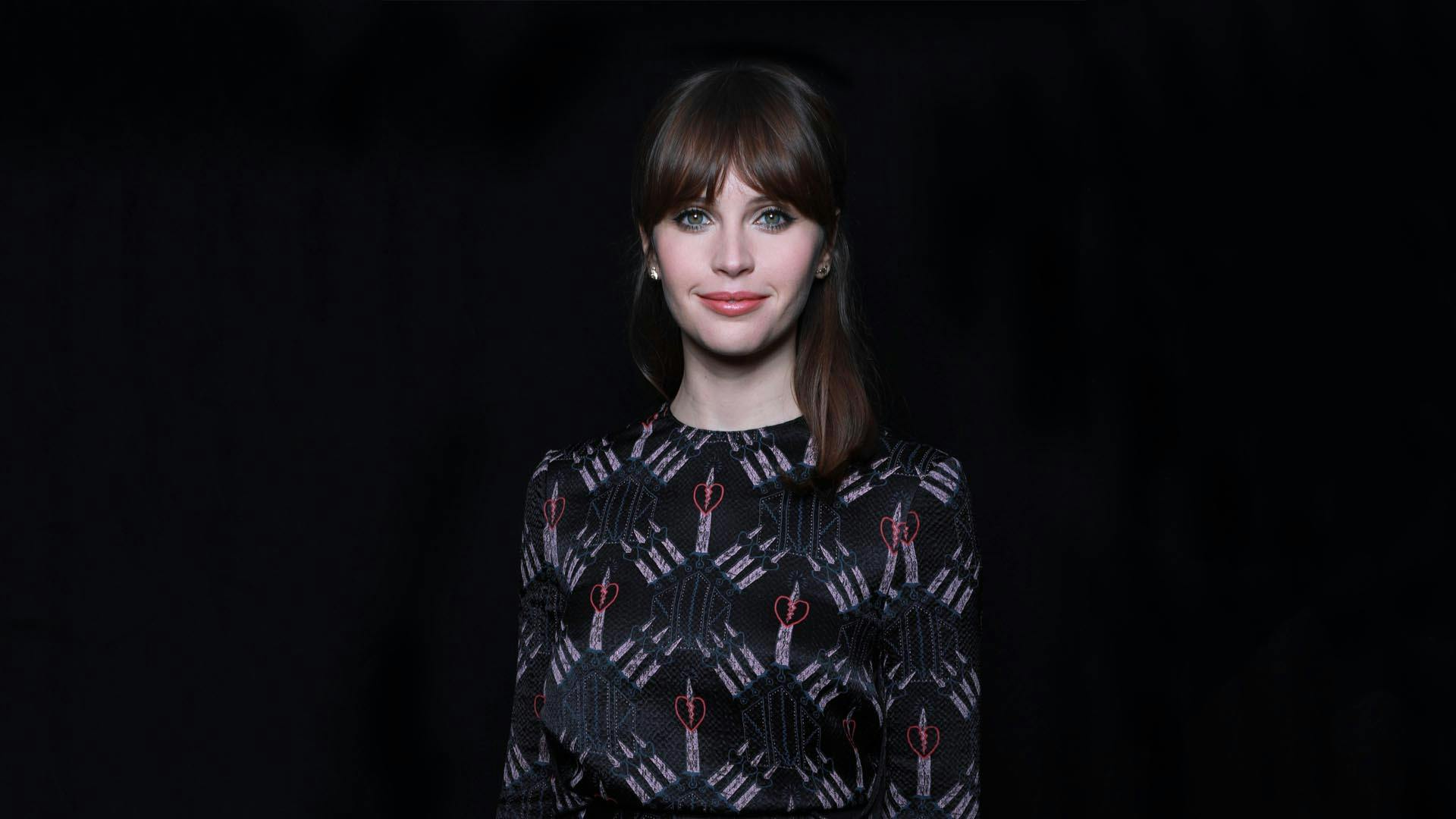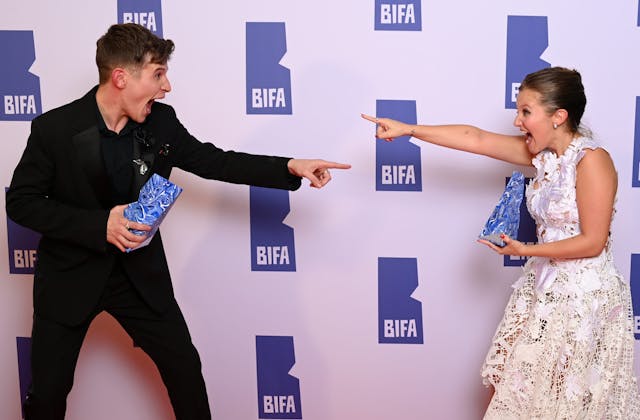It’s hard to believe that Felicity Jones has been working in the film industry for only a decade. Since her debut in 2008’s Flashbacks Of A Fool, the unassuming 35-year-old has gained incredible momentum over the 20 films she’s made since, effortlessly moving from English period dramas to US indies, studio prestige pics and Hollywood blockbusters – not bad going for a girl from the British Midlands. It’s this diversity – and stamina – that has brought the actress this year’s BIFA Variety award, following in the footsteps of the rather more established likes of Gary Oldman, Kate Winslet and Helen Mirren.
“It’s a great privilege,” Jones enthuses down the phone from her hotel in midtown New York, “and I’m very flattered to be given this award. I’ve had a long relationship with British independent film. It’s where I learned my craft, in many ways, so it’s wonderful. It’s very cool.”
Currently in the US promoting On The Basis Of Sex, a biopic inspired by the early career of Supreme Court Justice Ruth Bader Ginsburg, Jones looks set for a return to the awards season fray for the first time since 2015’s Academy favourite The Theory Of Everything, in which she played the wife of maths genius Stephen Hawking. “I’m a huge fan of Ruth Bader Ginsberg,” she says. “To play someone who is as extraordinary as she is, who stuck by her beliefs, who fights for equality, fights for people who sometimes feel like they don’t have a voice – I have 100% respect for her and it was an absolute privilege to play her.”
Have you attended the BIFAs before?
I have. I’ve been a few times over the years. It was one of the first award ceremonies I ever went to when I first started out. It’s always a great evening. It’s always good fun. It’s always a bit rock’n’roll. I’ve always had a good time.
What was your first experience of a movie set?
My very first movie was Flashbacks of a Fool, which I was also doing at the same time as Brideshead Revisited. So, I started out with those two – that was where I first dipped my toe into film.
Did you always have your heart set on having a film career?
When I started out, I had absolutely no idea. Initially, I thought I’d give it a go. I went to university, and then after university I thought, “I’ll just throw myself in. I’ll start auditioning, and I’ll see what happens. And if it doesn’t work out, I’ll have to think of something else.” So it started off one second at a time, initially, and then the first job I got out of university was Northanger Abbey, for television. And then it grew from that. I never had a grand plan. I always knew that I wanted to go into storytelling in some capacity. When I was younger I always wanted to be a journalist or work in magazines – I was fascinated by the thought of putting ideas out into the world. That was the goal. It was more about testing the water and seeing things grow, organically, from one project to the next.

When did you feel you were starting to get a toehold in this industry?
Oh gosh. [Laughs] That’s such a good phrase – “toehold”. It’s just a toe! It’s obviously a constantly evolving industry, so I think you’ve got to be flexible and you’ve got to adapt. Obviously, there’s this pace-shift and technology-shift. But I found very early on that I wanted to play interesting women and that I was drawn to very niche-y roles. Which is why I felt I was very lucky in doing Rogue One, doing a Star Wars film, because it definitely gave me a lot more power in that sense, to find those roles and get the financing together for those roles. But that had always been my agenda. I kept reading scripts that I absolutely loved, but with independent cinema you do need to have the clout, in a global way, which obviously doing something like Star Wars gives you.
You’ve worked with a lot of different but very interesting directors. How important is the director when you choose a project?
It has to be a combination of the script, the character and the director. And, ideally, you want all those things to be in play, to be confident in all those things in order to sign onto something. But the director is absolutely key. It’s pivotal. And they, obviously, dictate the tone. So much of the film comes from who they are, their character and their personality. Obviously you contribute to that, but I do feel that, ultimately, in the best films, you really feel the stamp of the director.
Is there a director that you think has had a particular impact on your career?
I feel, early on, Drake Doremus had a huge impact. That film, Like Crazy, definitely marked a moment for me. It was the first time I’d shot in Los Angeles, so that film really felt like a bridge-film between the UK and the US. And I’ve been very fortunate to have a career in both countries. And the way Drake worked, I’ve always retained that, in terms of bringing improvisation to other films that I’ve done – remembering that you have to fall off the tightrope sometimes when you’re acting. You have to be able to relinquish control and take risks, and not be scared to sometimes fall off the edge. So he has been a strong figure definitely, in my mind, in terms of how I still approach work today.
Was Drake’s process a surprise to you? Or was it a continuation of what you were doing in theatre?
I enjoyed it. I think, definitely, theatre prepares you for anything. If you can walk onto a stage, you can do anything. There’s nothing quite as frightening as acting on the stage. It really sharpens you. It trains you. You have such a long rehearsal period, so it’s also a place of experimentation. And, somehow, being able to experiment is important even when you’re down to the wire and you’re on set, and everyone is absolutely exhausted – you still have to keep experimenting, I feel. You still got to keep pushing it. And you’re always digging for the truth. So whatever that takes, really.
You made two films with Drake. Is there any difference between the American independent way of doing things and the way it is here?
Oh, it’s always very similar. I always find there is always such passion to the story that you’re telling, and that’s everywhere that I’ve shot. That’s what you feel. Those films aren’t necessarily about making the most money in the world, but there’s always a lot of love and affection going in. So that’s usually the driving force behind them.
You had your first encounter with the BIFAs in 2011 with Albatross, and then again two years later with The Invisible Woman. Do you feel that that was perhaps the period in which you were starting to come into your own?
Yeah. I was just trying stuff out. There wasn’t a lot of pressure, in the sense that I feel sometimes you get more pressure the more famous you become. Obviously, there are different pressures. But it was a time of great freedom and great experimentation, and I was incredibly open to trying things out. I worked pretty continually in that period, quite back-to-back. But in doing so, it was a real training. I just learned a huge, huge amount. I built confidence. Obviously, the more you do something, the better you get at it.
The character you play in The Invisible Woman is one of your few non-fiction roles. Are there characters you think of more than others, perhaps?
That’s interesting. I don’t know. It’s so funny – after each film you sort of go on to the next. You have to put them to bed a little bit.
Why?
Because I’m terribly obsessive and detailed-oriented when I’m making a film, and so when I finish, I do feel that I have exorcised that character and I’m ready to move on to the next. I absolutely have loved all the parts in different ways. I mean, that’s why I’ve taken them on. But I loved doing Brideshead Revisited, for instance, and The Invisible Woman definitely pushed me as an actor – to work with Ralph Fiennes, someone who is a fantastic, fantastic actor, and to see how he works. It definitely made me a better actress after doing that film. Without a doubt, I think.

What kind of detail do you go into? How does this obsession manifest itself?
Well, particularly with real-life characters – obviously, like Jane Hawking in The Theory Of Everything, and then in The Invisible Woman, where I was playing Nelly Ternan, and now playing Ruth Bader Ginsberg in On The Basis Of Sex – it’s all about the detail. It’s about in every way becoming that person, because it’s a big responsibility, taking on a real figure. So with Ruth Bader Ginsberg, I had the hair and the wigs. I had my teeth capped, so that my mouth would be same shape as hers. I had contact lenses to change the colour of my eyes. I look at the way that she moves. The walk. The way she uses her hands. I mean, I don’t stop until I feel completely inhabited that person.
Almost immediately after The Invisible Woman, you made The Amazing Spider-Man 2. Did that feel like a major move into Hollywood for you?
Well, I’ve always been interested in the balance between different genres. I love that, as an actor, you get to try all different things, so I love making all sorts of different films. And that was the challenge: I wanted to try something on a different scale. It tests you in a different way, as an actor. And I also like films that have a big reach. It’s really exciting and so, really, this was a case of the two things coming together, where there is quality, but you’re also making a story that you know will be seen across the world. It’s exciting.
What do you mean by a challenge? Do you mean the scale or the role?
Well, it was a much more physical role, and that’s what I loved. I was a real tomboy growing up. So when I was doing Rogue One and Spider-Man, and Inferno, I loved how much I was running around on set and learning how to do stunts. I love working with stunt teams. They’re an exquisite group of people. It’s a completely different experience, obviously, than when you’re doing more sort of drawing-room interactions. But my ideal is to move between everything. I think what’s important is the story. What is the story doing in the world? What do you have to say? That’s the key.
You obviously had all those elements in The Theory Of Everything. In retrospect, we know what a juggernaut that film turned out to be. But did you see it at the time?
We knew it was special in the sense that the family was so special – that Jane and Stephen Hawking were so extraordinary. But we had no idea, really. So much about independent cinema – well, any cinema, actually – is about the zeitgeist. What is happening in the world, and do people want to see that film in that moment? So there is not a lot you can do to predict. You have a gut instinct. I felt the humour in Theory Of Everything was such a driving force. Obviously, it was a very tender story about a relationship, about Stephen’s work, about fame, and trials and tribulations. But it came with such humour and humanity, that I did always think – I had a hunch – that it would appeal.
And when the awards buzz started happening, how did you feel about it?
I don’t know how to describe it. I mean, was working at the same time – I was working on A Monster Calls. I was flying between Los Angeles and Barcelona for about three months, so I remember being on a plane a lot. I would be in prosthetics and makeup on A Monster Calls in the morning, and the next day I would be in a ball gown on a red carpet. It was quite a full-on period.
Was that something you’d ever considered when you were younger? Did you ever think it might lead to the Oscars?
Oh no! It was always such a distant place. Growing up, my mum would take my brother and me to go and see the latest blockbuster. It was a real kind of highpoint of the ’90s – the ’90s blockbuster! And we’d go, and was a great fun watching them, but it did feel like the moon, the idea of the Oscars. So it’s been incremental. I feel I very gradually built up and made my life incorporate both the US and the UK. I never quite imagined it would be a part of my life, but it’s been a very cool part of it.
Did you see a change in the kind of roles you were being offered?
You just get more opportunities. I think it comes back to confidence. You build confidence when you read a script and you think, “Oh my gosh, I’d be really good in this,” and you follow it through. I mean, it’s like anything – the more you do something, you do get better at it, don’t you? I think you have more confidence going, “Oh I’m not sure about that, I’m going to leave it,” and you know what you want a little bit more. And somehow, having those awards does reinforce that confidence.
Do you need other people as a sounding board, or are you confident in your choices?
Well, I think you always have to work as a team. I work very closely with my agents in the US and the UK. Collaboration is key in everything. It’s a process of discussion. But often, when something is good, everyone knows it’s good. So it’s usually a no-brainer.
Playing the lead in Rogue One marked a big sea-change in the world of action and sci-fi movies, but what did that role mean to you, personally?
Oh, it’s been brilliant. It’s been brilliant. Just fantastic. Kathleen Kennedy has done incredible work in championing women in the Star Wars universe. It’s just been absolutely marvellous. We started to see, from Jennifer Lawrence doing The Hunger Games, a great change in cinema, with women taking on those leading action roles. They do tend to do well in the box office, so it’s been incredible, and it’s given us many more opportunities. And that’s what’s really exciting, because it’s great fun taking on those roles.
And, finally, after averaging two films a year since you started, do you have any plans to take some time off?
[Laughs] Time off? At some point! Over Christmas, I’ll be spending time with my family, which I’m really looking forward to, back in the UK.




